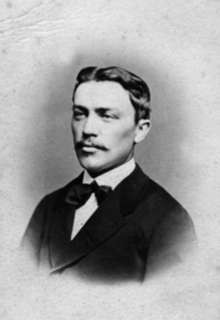Ivan Pulyui
| Ivan Pului | |
|---|---|
 |
|
| Born | 2 February 1845 Hrymayliv, Austrian Empire (present-day Ukraine) |
| Died | 31 January 1918 (aged 72) Prague, Austria-Hungary (present-day Czech republic) |
| Nationality | Ukrainian |
| Alma mater |
University of Vienna University of Strasbourg |
| Known for | X rays |
| Scientific career | |
| Fields | Physicist |
| Institutions | Czech Technical University in Prague |
| Doctoral advisor | August Kundt |
Ivan Pului (son of Iwan Pului Ukrainian: Іва́н Пулю́й, син Па́вла Пулю́я; German: Johann Puluj; 2 February 1845 – 31 January 1918) was a Ukrainian physicist and inventor, who has been championed as an early developer of the use of X-rays for medical imaging. His contributions were largely neglected until the end of the 20th century.
Ivan Pului graduated with honors from Theological Faculty of the University of Vienna (1869), later also from the Department of Philosophy (1872). In 1876 Pulyui finished his doctorate on internal friction in gases at the University of Strasbourg under supervision of August Kundt. Pului taught at the Navy academy in Fiume (Rijeka, Croatia) (1874–1876), University of Vienna (1874–1884) and the German part of the Higher Technical School in Prague (1884–1916). He served as the rector of the Higher Technical School in Prague (German part) in 1888–1889. Puluj also worked as a state adviser on electrical engineering for Bohemian and Moravian local governments.
In addition he completed a translation of the Bible into the Ukrainian language.
Puluj did heavy research into cathode rays, publishing several papers about those rays between 1880 and 1882. In 1881 as a result of experiments into what he called cold light Prof. Puluj developed the Puluj lamp; it was awarded the Silver Medal at the International Electrotechnical Exhibition in Paris, 1881. Throughout the world, it has become known as the "lamp of Puluj" and even it was mass-produced for some time.
...
Wikipedia
